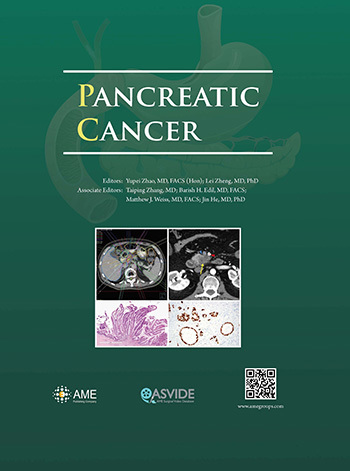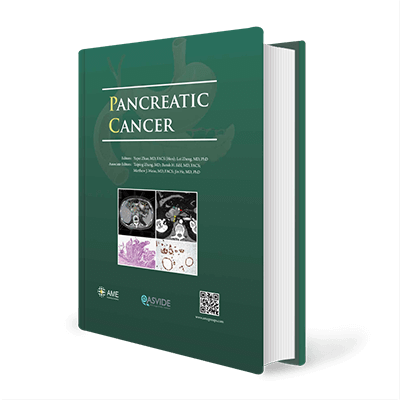
Pancreatic Cancer
| Editors: | Yupei Zhao; Lei Zheng |
Publisher: AME Publishing Company (2015)
ISBN-13: 978-9881402776
Hardcover: 461 pages
Language: English
Pancreatic cancer remains to be a challenge for the health care providers in the world. For the past three decades, we have made few breakthroughs for managing this malignant disease. Unless a breakthrough would be made in the near future, as projected, pancreatic cancer would become the second leading cause of death from cancer diseases in the United States by 2020. The contributions of the clinicians and clinical researches to the field of pancreatic cancer have revolutionized the entire medicine and surgery field. Many chapters of this book have testified the importance of the advancements in the management of pancreatic cancer as landmarks in the history of medicine and surgery.
Editors
| Yupei Zhao | Department of General Surgery, Peking Union Medical College Hospital, Chinese Academy of Medical Sciences and Peking Union Medical College, Beijing 100730, China |
| Lei Zheng | Departments of Oncology, Surgery; The Sidney Kimmel Cancer Center; The Skip Viragh Center for Pancreatic Cancer Research and Clinical Care; The Sol Goldman Pancreatic Cancer Center, Johns Hopkins University School of Medicine, Baltimore, MD 21287, USA |
Associate Editors
| Taiping Zhang | Department of General Surgery, Peking Union Medical College Hospital, Chinese Academy of Medical Sciences and Peking Union Medical College, Beijing 100730, China |
| Barish H. Edil | Department of Surgery, University of Colorado Anschutz Medical Campus, Aurora, CO 80045, USA |
| Matthew J. Weiss | Department of Surgery, The Sol Goldman Pancreatic Cancer Research Center, The Johns Hopkins University School of Medicine, Baltimore, MD 21287, USA |
| Jin He | Department of Surgery, The Johns Hopkins Hospital, Baltimore, MD 21287, USA |
Table of Contents
Preface
Epidemiology of pancreatic cancer
1 Pancreatic cancer incidence and mortality patterns in China, 2011
10 Glucose intolerance and the risk of pancreatic cancer
Pathology of pancreatic cancer
17 Pancreatic adenocarcinoma pathology: changing “landscape”
34 The role of epithelial-mesenchymal transition in pancreatic cancer
40 Histamine regulation of pancreatitis and pancreatic cancer: a review of recent findings
Diagnostic methods of pancreatic cancer
51 Imaging preoperatively for pancreatic adenocarcinoma
66 Imaging of pancreatic cancer: an overview
73 Endoscopic ultrasonography for pancreatic cancer: current and future perspectives
85 Delayed diagnosis of pancreatic cancer reported as more common in a population of North African young adults
Treatment of pancreatic cancer
91 Pancreatic cancer surgery: past, present, and future
108 Current surgical management of pancreatic cancer
119 Surgical treatment of pancreatic head cancer: concept revolutions and arguments
124 Pancreatic cancer surgery and nutrition management: a review of the current literature
137 Preoperative therapies for resectable and borderline resectable pancreatic cancer
144 Management of periampullary adenocarcinoma by pancreaticoduodenectomy at a regional teaching hospital
151 Robotic pancreaticoduodenectomy for pancreatic adenocarcinoma: role in 2014 and beyond
161 Laparoscopic distal pancreatectomy for adenocarcinoma: safe and reasonable?
173 Can pancreaticoduodenectomy performed at a comprehensive community cancer center have comparable results as major tertiary center?
181 Outcomes of resected pancreatic cancer in patients age ≥70
188 Pancreatic fistula and postoperative pancreatitis after pancreatoduodenectomy for pancreatic cancer
196 Laparoscopic pancreaticoduodenectomy: a descriptive and comparative review
204 Surgery for oligometastasis of pancreatic cancer
214 Current status and future direction of chemotherapy for pancreatic cancer
221 Role of gemcitabine as second-line therapy after progression on FOLFIRINOX in advanced pancreatic cancer: a retrospective analysis
226 Intraperitoneal gemcitabine chemotherapy as an adjuvant treatment for patients with resected pancreatic cancer: phase II and pharmacologic studies
234 Advances of stereotactic body radiotherapy in pancreatic cancer
243 The role of radiotherapy in management of pancreatic cancer
255 Re-irradiation with stereotactic body radiation therapy as a novel treatment option for isolated local recurrence of pancreatic cancer after multimodality therapy: experience from two institutions
264 Evaluation of normal tissue exposure in patients receiving radiotherapy for pancreatic cancer based on RTOG 0848
271 Neoadjuvant therapy for localized pancreatic cancer: guiding principles
283 Novel adjuvant therapies for pancreatic adenocarcinoma
289 Adjuvant chemoradiation for pancreatic cancer: what does the evidence tell us?
301 Adjuvant radiation therapy for pancreatic cancer: a review of the old and the new
310 Self-expanding metal stents (SEMS) provide superior outcomes compared to plastic stents for pancreatic cancer patients undergoing neoadjuvant therapy
315 Nanovector-based therapies in advanced pancreatic cancer
326 Immunotherapy for pancreatic ductal adenocarcinoma: an overview of clinical trials
342 Diagnosis and management of cystic lesions of the pancreas
356 Current and future systemic treatment options in metastatic pancreatic cancer
372 Treatment of locally advanced unresectable pancreatic cancer: a 10-year experience
382 A comparison of three treatment strategies for locally advanced and borderline resectable pancreatic cancer
390 Locally advanced versus metastatic pancreatic cancer: two different diseases with two different treatment approaches?
393 HIFU for palliative treatment of pancreatic cancer
404 Use of irreversible electroporation in unresectable pancreatic cancer
409 Pain management of pancreatic head adenocarcinomas that are unresectable: celiac plexus neurolysis and splanchnicectomy
Prognosis of pancreatic cancer
416 Quality-of-life (QoL) as a predictive biomarker in patients with advanced pancreatic cancer (APC) receiving chemotherapy: results from a prospective multicenter phase 2 trial
423 Change in CA 19-9 levels after chemoradiotherapy predicts survival in patients with locally advanced unresectable pancreatic cancer


